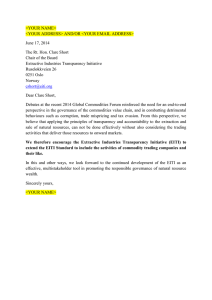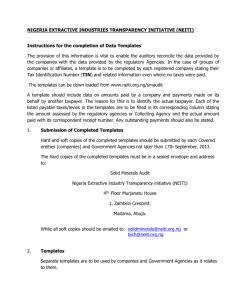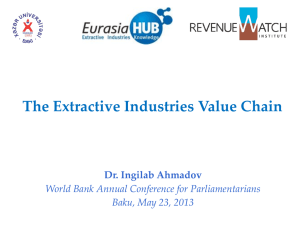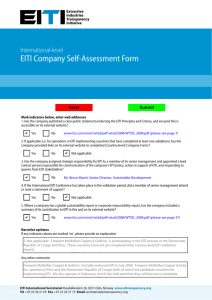EITI Implementation in Nigeria: Outcomes, Impacts and Challenges Mr. Zainab Ahmed,
advertisement
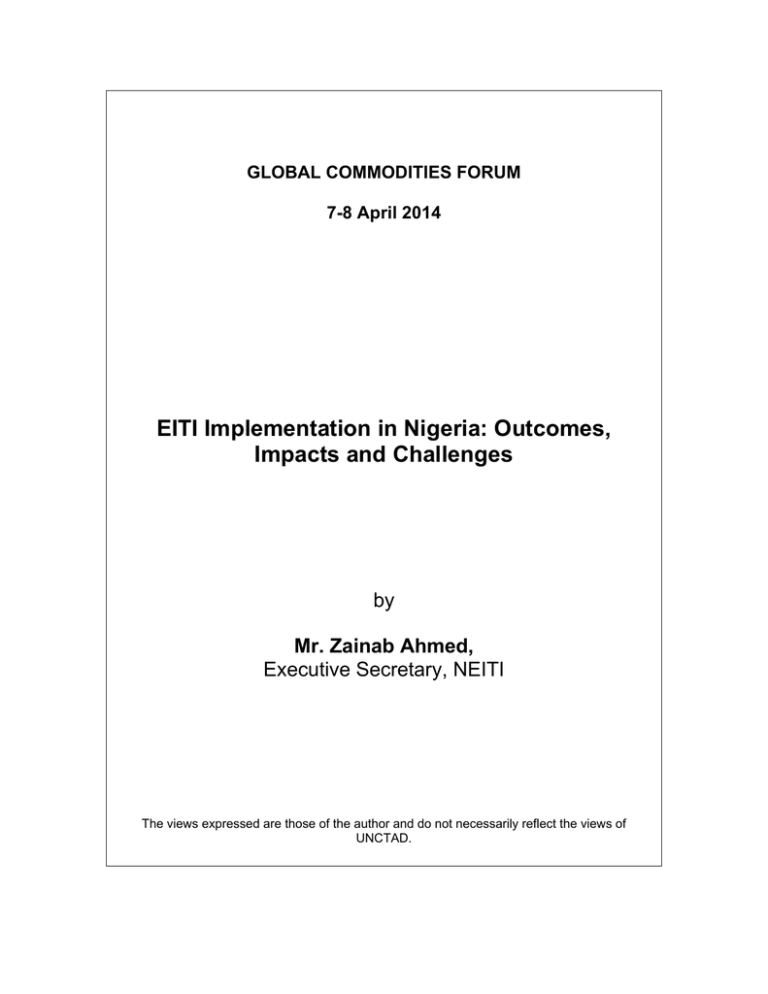
GLOBAL COMMODITIES FORUM 7-8 April 2014 EITI Implementation in Nigeria: Outcomes, Impacts and Challenges by Mr. Zainab Ahmed, Executive Secretary, NEITI The views expressed are those of the author and do not necessarily reflect the views of UNCTAD. EITI IMPLEMENTATION IN NIGERIA: OUTCOMES, IMPACTS AND CHALLENGES BY MRS. ZAINAB AHMED, EXECUTIVE SECRETARY, NEITI 1 In 2003, the Federal Government commenced a comprehensive economic reform program under the National Economic and Empowerment Development Strategy (NEEDS) 2 The reform targeted four main areas: •Improve Nigeria’s macroeconomic environment; •Pursue structural reforms; •Strengthen public expenditure management •Institutional and governance reforms. Decision to implement EITI in Nigeria NEITI National Conference. 1st of its was part of the overall reform kind programme of the Government. 3 • Opaque transactions in the awards of OPLs • Financing mechanisms • Inappropriate disclosures of oil and gas production figures/revenues • Corruption and unethical practices in the sector • General poor governance of the sector, leading to socio – economic crises • Increasing demand for transparency and accountability by Nigerians 4 • Nigeria signed up to the EITI in • The Report was made public in 2006 and identified the June, 2003. sum of US$232m as discrepancies in revenue • Implementation began in between government February, 2004. receipts and companies’ payments. • Supported with Legislation in May, 2007 (NEITI ACT) • Report also outlined various governance lapses, financial malpractices, physical and • NEITI conducted its first audit process deficiencies in the in the oil and gas industry sector covering 1999‐2004. 5 • An Inter‐Ministerial Task • Nigerians awareness Team (IMTT) was set up by and consciousness the Government to were raised and examine issues highlighted discussions began on by the audit and develop a issues of extractive comprehensive revenue receipts and remediation plan. payments transparency in the sector • A second audit covering year 2005 was conducted with more revealing • More on NEITI disclosures. Websitewww.neiti.org.ng 6 • Legislation - the NEITI Act of 2007. The Law institutionalised the EITI process in Nigeria. • Nigeria became the first country to back the EITI process with an enabling law and became a reference point in all advocacy, public agitation and demand for transparency. • The Act also requires NEITI to conduct Financial, Physical, Process and Resource Application audits of government institutions. 7 • NEITI became ‘compliant’ • The 2006-2008 audit which serves two critical cycle were conducted functions. First, the during this time promotion of dialogue and learning at the country • A five year strategic level and the safeguard of plan was developed the EITI brand by holding to meet with NEITI’s all implementing countries post compliant to the same global challenges standard. 8 • New NSWG inaugurated on August, 2012 • Three major industry audits conducted: 2009-2011 Oil & Gas, 2007-2011 Solid Minerals and 2007-2011 Fiscal Allocation and statutory disbursement audit • Robust engagement with the civil society, the Parliament, Government, Companies, media and the public 9 HOW EITI/NEITI WORKS Companies disclose payments Government discloses receipt of payments Government Spending Award of licenses & contracts Regulation & monitoring of operations Independent verification of tax & royalty payments ”EITI report” Revenue distribution & management Implementation of sustainable development policies Oversight by a Multi-Stakeholder Group 10/04/2014 The EITI provides a forum for dialogue and a platform for broader reforms 10 Aims at ensuring revenue streams Focused on volumetric due to Government were made by data Extractive Companies Physical Audit Solid Minerals Companies and Regulators Focuses on statutory disbursements to the 3 Aims at identifying and flagging systems & control tiers of government from the federation account lapses Financial Process Audit Audit Fiscal Allocation & Statutory Disbursement Audit OIL & GAS: NNPC, DPR, JV Companies, PSCs, Marginal Fields, Sole Risks, CBN, FIRS, OAGF, PEF, NLNG, PSF, PPPRA, PTDF, NDDC, Ministry of Commerce, Downstream companies, etc. , Sub-National Reporting (Federal, States and LGAs) 11 NEITI audit reports have exposed massive decay and monumental corruption in the sector. • Incapacity of regulatory agencies to verify royalty and petroleum profit tax computations. • Poor metering infrastructure for • $9.8Billion was reported as outstanding recoverable over a crude oil production accounting ten year period (1999‐2008) arising from: • Poor record keeping and other – Underpayments & Under‐ assessments leakages in the system – Differences between what was paid and what was • Subsidy payments increased by 71 received per cent from N406 billion in 2009 to • Slow remediation of lapses N695 billion in 2010 and by 174 per cent in 2011 to N1.90 trillion. 13 • Enactment of legislation on extractive revenues transparency and governance ‐ the NEITI Act, 2007. • About $2Billion recovered into the Federation Account. Reports also exposed $9.8Billion as potential revenue to the Federation due to under‐ assessment, under‐ payment and variance • Opening up of an opaque between what companies oil and gas sector to wider paid and what government public knowledge and received in the form of scrutiny by the public, royalties, taxes, signature industry experts and other bonuses, levies and sales stakeholders of equity crude. 14 • There is now greater transparency and disclosures in the oil and gas sector and global stakeholders are taking notice of Nigeria’s commitment to EITI. • Provided the platform for Nigerians to interrogate and discuss broader issues of national development . • NEITI has lifted Nigeria’s profile in the eyes of investors which has led to significant increases in FDI not only in the oil sector (about US$ 6 billion a year by 2010) but also in other non-oil sectors US$3 billion. • Generated accurate data that has been crucial for national economic planning. 15 • Exposed irregularities in the extractive sector, proffer solutions and make recommendations • Led to the introduction of the Petroleum Industry Bill and general reforms of the industry. • The provisions of section 4 and 190 in the PIB has further strengthened NEITI’s oversight role in the oil and gas sector. • Increased public awareness and demand for accountability on extractive revenue management. • Increased the revenue flows into the federation account (about $1bn was recovered between 1999‐2004, $550m in 2005) and $450m in 2006‐ 2008) as a result of under‐ assessment and under‐ payments 16 • NEITI Audit reports have led • Transformation Agenda of the current to improved tax collection Administration provides systems‐Royalties, PPT, for the full Signature bonuses for implementation of the Nigeria NEITI Act, 2007 in order to “reduce” corruption • Inter-Agencies Task Team and loss of revenue from the extractive sector (IMTT) set up to address remedial issues contained (Transformation Agenda final report, May 26, in NEITI audit reports 2011) 17 ¾ Regular Reporting in all Extractive sectors • ¾ Effective Communication and engagement with all stakeholders ¾ Stronger CSOs/ Legislative Partnership ¾ Automated Audit Processes ¾ Better relations between Extractive sector operators, companies and government ¾ Improved Human Capital among government regulatory agencies to match the IOCs 18 THANK YOU FOR LISTENING 19
